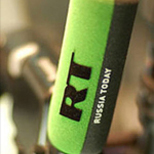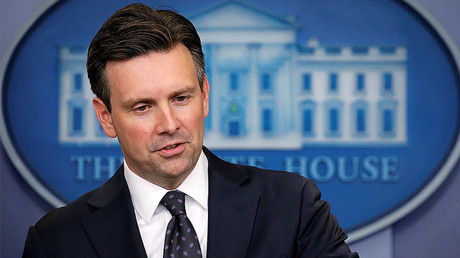RT critics admit promotion of Russian media threat is a money racket
This blog represents a range of opinions prepared by a team of authors working at RT. It contains commentary, views, feedback and responses to various events and news media items.

Regular readers of RT Editorial will know this column has provided evidence of how think tanks, which are increasingly indivisible from lobby groups, faithfully promote the specific agendas of their paymasters regardless of their stated high-minded missions.
When it comes to Russia, most of these faux-academic concerns have primarily concerned themselves with whipping up hysteria about a supposed imminent military danger to Eastern Europe. Shocker: almost all of them are funded by weapon manufacturers and entities like the US Department of Defense. In other words, the very people who need a bogeyman to justify heightened armed forces spending.
However, convincing the general public that Moscow is going to overrun Europe has always been a hard sell. Mainly because Russia is not the USSR and its military spending is much smaller compared to NATO. For example, the Kremlin’s 2017 defense budget is around $45 billion. This compares to the $622 billion Washington has projected for the coming year. That does not include all the other NATO members, such as the United Kingdom, which recently signed a $125 billion contract with General Atomics, just for the supply of drones.
Old dog, new tricks
Probably aware they needed a new schtick, in recent years, bodies like The Atlantic Council and the Center For European Policy Analysis have expanded messaging about the supposed Russian threat to the long-reigning mainstream media consensus. RT is, of course, the favorite target and scary monster. As a result, we see a kind of schizophrenic discourse where the network oscillates from being a huge danger to something nobody watches (but still is a cause for a cash call), depending on which agenda they are pushing on a given day.
With this in mind, it was interesting to note Monday’s Guardian piece, headlined “EU escalates its campaign against Russian propaganda,” for two reasons. Firstly, because the newspaper apparently couldn’t think of an example of “Russian propaganda” in an article about “Russian propaganda” and instead used a story promoted by an American website, to illustrate the purported Russian threat: “In recent weeks the unit (Stratcom East, an EU outfit dedicated to watching Russian news services) has been correcting a widely shared and entirely false story that claimed that a 1,000-strong mob chanting “Allahu Akbar” burned down Germany’s oldest church,” they wrote. This story appeared on Breitbart, which is based in Los Angeles and is 100 percent American owned.
Then they followed up, with “EU officials estimate that Russia spends $1bn (£801m) on state media outlets such as RT and Sputnik….” Quite why the EU needs to guess is beyond rational understanding, given how RT is transparent about its financing, which amounts to around $300 million this year, or less than a third of that appraisal. Not just that, but all media funding by the Russian state is widely publicized every year, and even adding up the RT and Sputnik budgets still amount to much less than half of the reported figure. So much for the MSM’s war on “fake news.”
Money, money, money
Just as the EU increased the strength of its “Stratcom East” annex from eleven staff to 19, and lobbed another €800,000 in its direction (because nearly $800 million for BBG and £289 million supplementary Defense & Security funding for BBC World Service clearly weren’t enough, not to mention the financial support for the likes of DW, France24, and Euronews to continue fighting the good fight), came a most enlightening conversation between a group of media ‘experts,’ specializing in the post-Soviet space.
The event was hosted by n-ost, a German advocacy group, funded by Washington’s National Endowment for Democracy (NED), which has earned a bit of a reputation for promoting“regime change” in countries independent of US foreign policy. The chat concerned whether “articles about Russian ‘propaganda’ now are more widely read than Russian 'propaganda’ itself.” Right now, you can take “Russian propaganda” to mean anything which offers an alternative view to the mainstream media consensus.
At the roundtable were an interesting bunch of folk. Alexey Kovalev, formerly of RIA Novosti, was joined by Vladimir Soloviev of Moldova’s Newsmaker, which gets its cash from the European Endowment For Democracy (the EU’s version of NED) and Gemma Pörzgen, a board member of Reporters Without Borders, a concern funded by George Soros, NED and the EU Commission.
As they spoke, our heroes seemed to realize how ridiculous the whole hysteria against Russian media has become. Pörzgen admitted that “in the case of Germany, for example, I think the problem is grossly exaggerated. Some so-called 'experts' have blown it up out of all proportion. There’s a lack of proper research on the subject that could provide an objective view. There’s a lot of propaganda around propaganda if you see what I mean.” Meanwhile, Kovalev conceded that (in Russia) “state TV channel budgets, both domestic and international, are being cut, projects are being wound down and so on.”
Freudian slip
It was toward the end of the discussion when things got fascinating when in this warm, relaxed echo-chamber atmosphere the brave info-warriors let it slip that their entire mission is essentially a money racket.
Take Kovalev: “the battle with “Russian propaganda” has already turned into a fully-fledged industry in which many people, including myself, have had successful careers. It would be stupid to give them up because of the negligibility of our field of study. That’s one reason.”
Soloviev: “I also see it as an industry, with budgets that need to be spent. In Moldova, the subject is a best seller on the internal political market. In 2015 the current Mayor of Chisinau (and deputy chair of the right-wing Liberal Party) won his third election thanks to the fact that he spent most of his election campaign fighting Russian tanks. But there’s nothing new about the city looking like the site of some kind of urban warfare.”
Pörzgen: “You’re right there, Alexey. There are so many people in the market who used to cover security issues and have now lost their jobs. But now they’ve seen the chance to get back into business. There are also lobbying groups such as the Atlantic Council, who have started running conferences all over Europe on the same subject: “The rising influence of Russian propaganda.”
And with that, you could have dropped the metaphorical mic. Because the same people who benefit, via funding for their projects, from stoking the fears of Russian domination of the information space, are acknowledging that it's fundamentally a gravy train. All aboard!




0 Comments:
Post a Comment
Subscribe to Post Comments [Atom]
<< Home